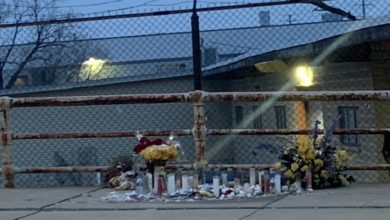Two MLK Day marches in Chicago seek to keep new civil rights movement going.
On Jan 15, over 400 people came together on a cold evening on Chicago’s southwest side to honor the radical vision of Dr. Martin Luther King, Jr, and to inaugurate a weekend of activism in his honor. On Jan 19, another vibrant march of over 300 marched through downtown to proclaim that #BlackLivesMatter.
The youth-led march and rally on Jan 15 was planned as part of an effort to reclaim the legacy of Dr. King, a task that organizers stressed was especially crucial in light of the epidemic of police violence which continues to strike at Black communities throughout the U.S.
As speaker Page May told the assembled crowd, the King that most students learn about in school has been sanitized in order to make him more acceptable to the mainstream establishment. It is this King–patient, humble, and above-all non-violent–that comes to stand in for the entirety of the Black civil rights movement of the 50s and 60s. In a cruel twist of irony, this image is then used to police the acceptable bounds of protest and to reign in all but the most mild actions. It’s obvious to those who have studied and learned from King that he would be appalled by such a use of his legacy.
As speakers told the crowd, King’s actual message was far more radical than many have been led to believe. He spoke of the abolition of poverty, of the end of militarism and imperialism and the eradication fo the prison industrial complex. There is nothing peaceful about struggling for your life.
Around 7:30 PM, after a series of speeches and performances, protesters began moving west down Roosevelt Road, drawing shouts of support from people in cars and apartments. After marching for more than an hour, the crowd came to the Cook County Juvenile Detention Center on the city’s west side. There hundreds of children, primarily Black youth, are locked up away from their families and schools. The imposing building is a harrowing example of the school-to-prison pipeline in action.
Another rally was held outside the jail, where speakers from diverse communities expressed solidarity and support for the reclamation of Dr. King’s vision. Underlining the commonality of divergent struggles, speakers from the Palestinian community told the crowd that “we know what it means to lose our loved ones to American made bullets.”
It is only through embracing the entirety of Dr. King’s message that we will be able to tear down the walls that imprison us, both here in Chicago and across the ocean in Palestine. Only with an end to capitalism, racism, imperialism and exploitation will we finally win.






